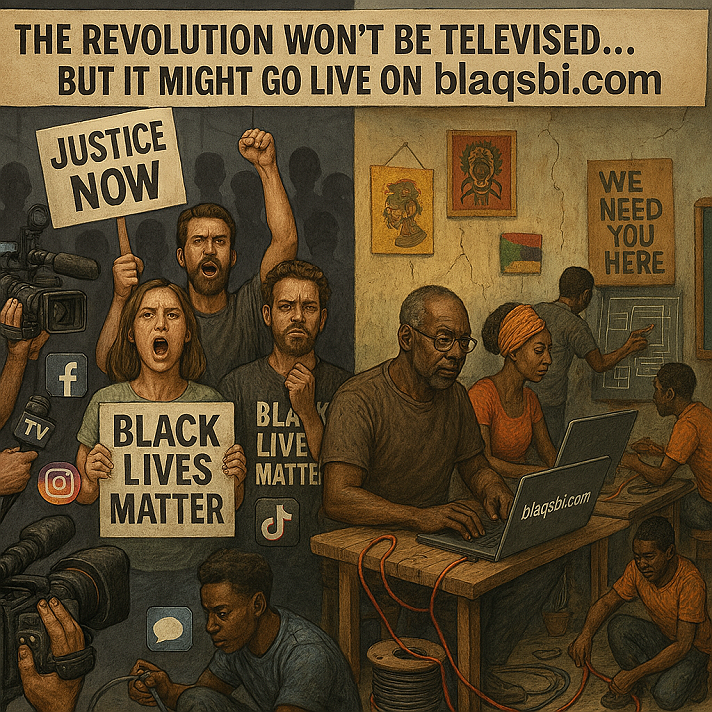"Why do We March for Their Awakening—But Won’t Log In to Our Own Liberation"
What’s Wrong With This Picture?
Performative Allyship vs. Embodied Investment
When white people launch a protest—even one rooted in their own self-interest—it’s often amplified by media, institutions, and social capital. Black people, conditioned by centuries of coalition-building, survival, and without much thought or hesitation, show up immediately to support, promote and get involved - hoping this time “they finally get acceptance with equal rights and treatment by the status quo.”
But when Black people build our own infrastructure—a platform like Blaqsbi.com—we’re met with silence, skepticism, or passive support (“I love this idea!”… followed by very few sign-ups).
The Illusion of Influence on White Platforms
Many believe that posting about Black pain, pride, or policy on Facebook, Instagram, X, or TikTok is activism. But these platforms:
- Profit from our trauma
- Shadowban our calls to action
- Erase our history with algorithmic bias
- Offer no ownership, no equity, no long-term power
Yet we keep feeding them our energy, our data, and our dreams—while ignoring the house we’re trying to build for ourselves next door.
The Trust Gap & Scarcity Mindset
Centuries of broken promises, failed Black-led ventures (often due to lack of support, not vision), and systemic sabotage have created a quiet cynicism:
“Another Black app? It’ll probably fail.”
So instead of giving it a chance, we withhold the very things it needs to survive: our presence and support.
Comfort in the Familiar, Even When It Harms Us
Massa’s house has Wi-Fi, likes, and 500M users. Our house is still wiring the electricity.
It’s easier to protest within the system than to build outside of it—even when that system was never designed for our flourishing.
Performative Allyship vs. Embodied Investment
When white people launch a protest—even one rooted in their own self-interest—it’s often amplified by media, institutions, and social capital. Black people, conditioned by centuries of coalition-building, survival, and without much thought or hesitation, show up immediately to support, promote and get involved - hoping this time “they finally get acceptance with equal rights and treatment by the status quo.”
But when Black people build our own infrastructure—a platform like Blaqsbi.com—we’re met with silence, skepticism, or passive support (“I love this idea!”… followed by very few sign-ups).
The Illusion of Influence on White Platforms
Many believe that posting about Black pain, pride, or policy on Facebook, Instagram, X, or TikTok is activism. But these platforms:
- Profit from our trauma
- Shadowban our calls to action
- Erase our history with algorithmic bias
- Offer no ownership, no equity, no long-term power
Yet we keep feeding them our energy, our data, and our dreams—while ignoring the house we’re trying to build for ourselves next door.
The Trust Gap & Scarcity Mindset
Centuries of broken promises, failed Black-led ventures (often due to lack of support, not vision), and systemic sabotage have created a quiet cynicism:
“Another Black app? It’ll probably fail.”
So instead of giving it a chance, we withhold the very things it needs to survive: our presence and support.
Comfort in the Familiar, Even When It Harms Us
Massa’s house has Wi-Fi, likes, and 500M users. Our house is still wiring the electricity.
It’s easier to protest within the system than to build outside of it—even when that system was never designed for our flourishing.
How Do We Fix It?
1. Shift from “Talking Points” to “Use”
Stop saying “We need a Black social platform!” and start logging in, posting, connecting, and inviting others.
Liberation isn’t declared—it’s practiced daily.
If 1 million Black people used Blaqsbi.com just 10 minutes a day, it would become unstoppable.
2. Redirect Energy, Not Just Anger
Every time you post about racism, oppression ,injustice or inequality on a white-owned platform, ask:
“Am I building their engagement—or our future?”
Then cross-post to Blaqsbi Tag creators. Start groups. Make it the hub for Black discourse.
3. Treat Black Tech Like Sacred Infrastructure
This isn’t “just an app.” It’s digital land.
- Share it like you share protest signs
- Promote it like you promote Black businesses
- Defend it like you defend your block
4. Create Cultural Incentives
- HBCUs: Make Blaqsbi part of student onboarding
- Churches & orgs: Host “Digital Homecoming” events
- Creators: Go “Blaqsbie” for key content
- Families: “Relatives, Grandparents and Children"on Blaqsbi now—come see thier posts!”
5. Name the Hypocrisy Gently but Firmly
When someone says “We must build our own!” but isn’t on the platform:
“Brother/Sister—your voice and activity is needed on the platform, not just thinking about it.”
The Hard Truth
White people don’t need Black participation to launch a movement—they have capital, access, and default credibility.
But Black movements die without mass Black participation.
We cannot outsource our liberation to allies—even well-meaning ones.
And we cannot build a new world while refusing to step into the rooms we’ve built ourselves.
The revolution won’t be televised.
But it might just go live… on Blaqsbi.com.
So let’s stop waiting for permission.
Let’s stop performing wishful freedom on enemy servers.
Let’s come to our new digital home—and build both Liberation and Legacy!


























